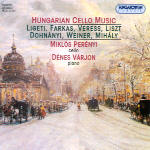Bartók is the invisible presence on this CD of (mostly) 20th century cello music by Hungarian composers since his stylistic fingerprints are on most of the works. The other very visible presence is Sándor Veress. His early Sonata for cello and piano (with a major role for the piano) and later Sonata for solo cello occupy a third of the playing time, making this disc essential for anyone interested in this grossly underrecorded modern master. Written in 1933 while the 28-year-old composer was studying piano with Bartók, the cello/piano sonata boasts a delightful central Minuet and outer movements that feature Bartókian rhythms and playful dialogues between the instruments. The large-scale solo cello sonata dates from 1966-67 and blends mature complexity with Romantic temperament. Like all of Veress’ music I’ve heard, it has drama, monumentality, and even in its most uncompromising moments, an underlying lyricism that lends emotional weight.
The remainder of the disc is made up of shorter works. Ference Farkas’ Ballada is an attractive piece whose formal structure belies its title. Farkas, an influential teacher-composer, taught some of Hungary’s major musical figures, including György Ligeti whose Cello Sonata (Dialogue and Capriccio) leads off the disc. An attractive virtuoso vehicle, its first movement variations on a folk melody dates from 1948 while the stylistically different second movement, Capriccio, came five years later and reflects the composer’s new-found modernism. Perhaps the real find among the short pieces on the rest of the disc is András Mihály’s Movement for Cello and Piano. Its seven-and-one-half minutes pack enough material for a piece three times as long. Mihály wrote it in 1962 as a birthday tribute to Zoltán Kodály and it abounds in attractive melodies and virtuoso pyrotechnics.
Miklós Perényi, a familiar name to collectors, has an extensive discography and has ranked among the world’s premier cellists for more than three decades. He plays everything on the disc with conviction, fully identifying with each composer’s sound world, and he delivers it all in a big, full tone that’s irresistible in itself. His piano partner, Dénes Várjon is a prize-winner who’s appeared with major conductors and soloists. The pair works wonders together. Repertoire, interpretations, and top-flight sound all come together to make this an essential disc for all cello enthusiasts.
































